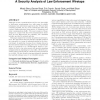Free Online Productivity Tools
i2Speak
i2Symbol
i2OCR
iTex2Img
iWeb2Print
iWeb2Shot
i2Type
iPdf2Split
iPdf2Merge
i2Bopomofo
i2Arabic
i2Style
i2Image
i2PDF
iLatex2Rtf
Sci2ools
CCS
2009
ACM
2009
ACM
Can they hear me now?: a security analysis of law enforcement wiretaps
Although modern communications services are susceptible to third-party eavesdropping via a wide range of possible techniques, law enforcement agencies in the US and other countries generally use one of two technologies when they conduct legally-authorized interception of telephones and other communications traffic. The most common of these, designed to comply with the 1994 Communications Assistance for Law Enforcement Act (CALEA), use a standard interface provided in network switches. This paper analyzes the security properties of these interfaces. We demonstrate that the standard CALEA interfaces are vulnerable to a range of unilateral attacks by the intercept target. In particular, because of poor design choices in the interception architecture and protocols, our experiments show it is practical for a CALEA-tapped target to overwhelm the link to law enforcement with spurious signaling messages without degrading her own traffic, effectively preventing call records as well as content...
CCS 2009 | Law Enforcement | Law Enforcement Agencies | Security Privacy | Standard Calea Interfaces |
| Added | 19 May 2010 |
| Updated | 19 May 2010 |
| Type | Conference |
| Year | 2009 |
| Where | CCS |
| Authors | Micah Sherr, Gaurav Shah, Eric Cronin, Sandy Clark, Matt Blaze |
Comments (0)

